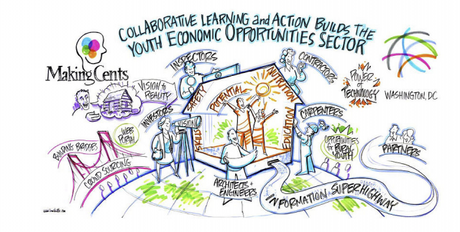
Earlier this month, I had the pleasure of presenting at the 2015 Global Youth Economic Summit in Washington, DC, where over 450 leaders and practitioners from 50 countries came together. The theme of the overall summit was “Scale in Practice,” and it examined how best to design youth economic empowerment projects that maximize impact, scale, and sustainability.
My session was “The Voice of Youth in Economic Policymaking: How to Advocate for the Right Reforms” and I presented with Simon Van Melick from SPARK (a Dutch-NGO specializing in youth entrepreneurship in conflict affected societies) and Hania Bitar from Palestinian Youth Association for Leadership and Rights Activation (PYALRA). Unlike the other presenters at the Summit, who focused on the initiatives like vocational programs, microfinance, and innovations in mobile-based educational games, my panel focused on how to engage and empower youth to be involved in political and economic reform of their local communities.
CIPE’s strategy for youth programming is to prepare young people to become self-dependent and take initiative. To empower and engage youth as leaders of tomorrow, CIPE takes four approaches: teach civic education, equip youth with leadership skills, empower civil society to be inclusive and engage youth in the policymaking process, and provide platforms for youth to share ideas on reform.
I shared examples of how CIPE cooperates with private sector organizations to support youth to have a voice in the policymaking process, including the Islamabad Chamber’s involvement in the National Youth Policy, the Serbian Association of Managers’ partnership with Ministry of Youth and Sports to link the private sector, university students, and the government, as well as CIPE’s leadership development program, ChamberLINKS.
Van Melick from SPARK shared about his experience leading Youth Engagement programs in Burundi, South Sudan, and Palestine. Similar to CIPE’s strategy, SPARK aims to involve youth in civil society and policymaking so that they can advocate for and improve their socioeconomic positions. Since implementing the project in 2012, they have achieved multiple milestones including getting youth on candidate lists for political parties in Burundi, involving youth in South Sudan’s National Constitutional Review, and creating a Youth Commission in the Parliament in Palestine. Van Melick also highlighted challenges of working on this program — mainly the instability of the political environment, lack of trust between the government and youth, lack of transparency, and the difficulty advocating for inclusivity among all stakeholders.
Bitar from PYALRA, which is SPARK’s main implementing partner in Palestine, further discussed the complexity of leading youth programs in a fragile state. In a country where youth face a plethora of challenges (nearly 50 percent of the population are under the age of 30; youth unemployment is at 27 percent; there is a difficult legal and regulatory environment for starting businesses), it is crucial to have youth involved in their communities to express their needs. Bitar also warned that if the situation does not change, the future will become worse for the younger generation.
“They find more beauty in death than in life,” she said. “Young people in Palestine are stuck and hopeless; they are frustrated. More young people, as a result, are resorting to violence. And this is simply not acceptable – as a society, we must address this by changing their attitudes and engaging them in political and economic reform. They must own and feel the change of the society.”
Indeed, violence committed by Palestinian youths has been on the rise lately. And perhaps it’s only a matter of time until other nations suffering from high youth unemployment also experience similar outbursts stemming from their frustrations. More than ever, youth engagement is critical to support and encourage young people to engage with their governments, public sectors, and civil societies in constructive ways. Because that is the only way that youth’s voice will be heard.
View the presentation from the panel here.
Maiko Nakagaki is a Program Officer for Global Programs at CIPE.

